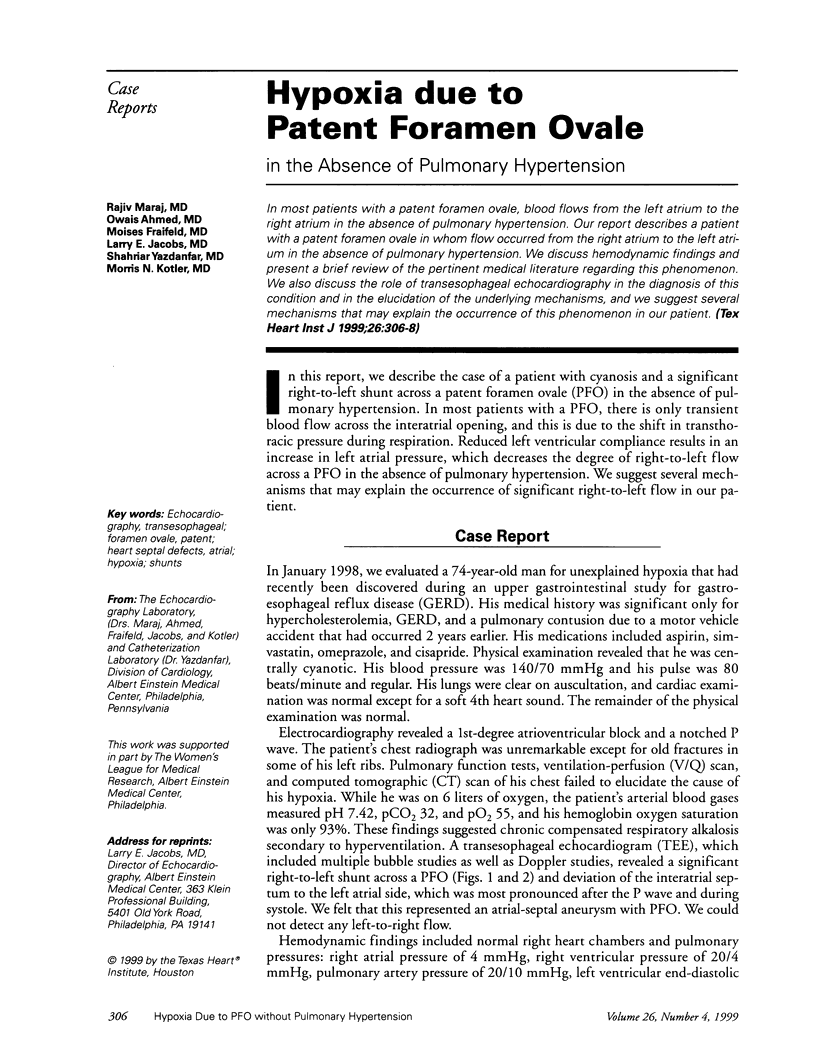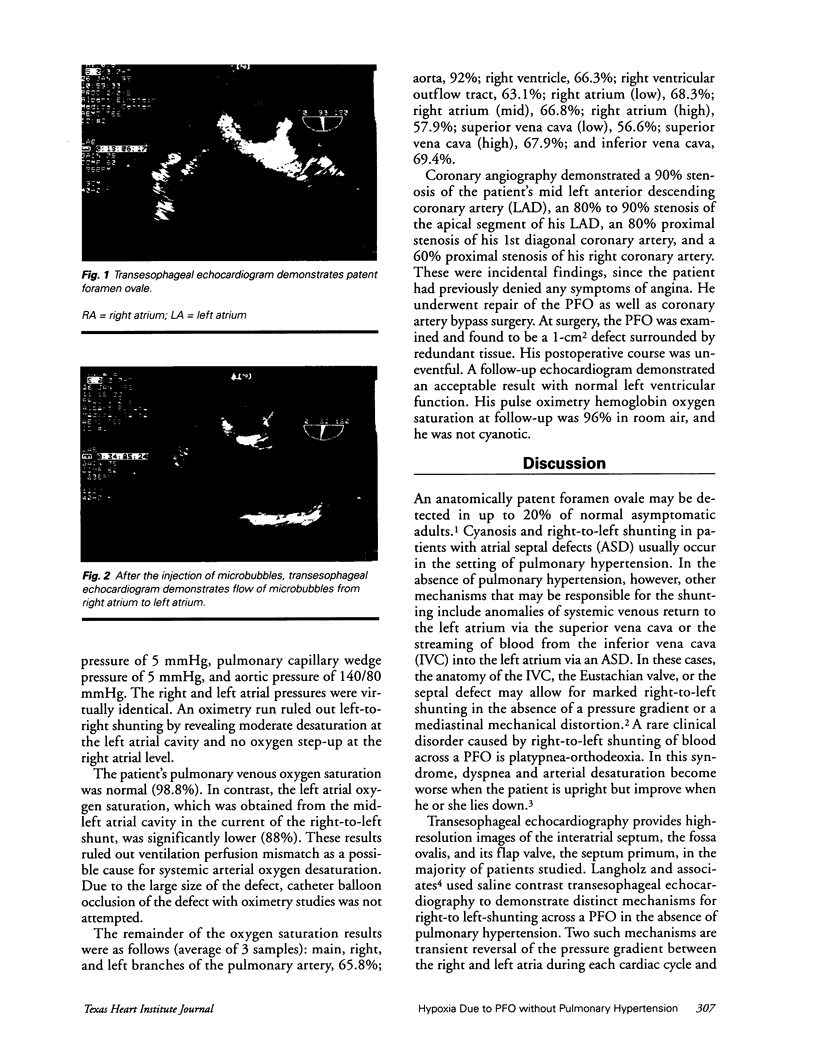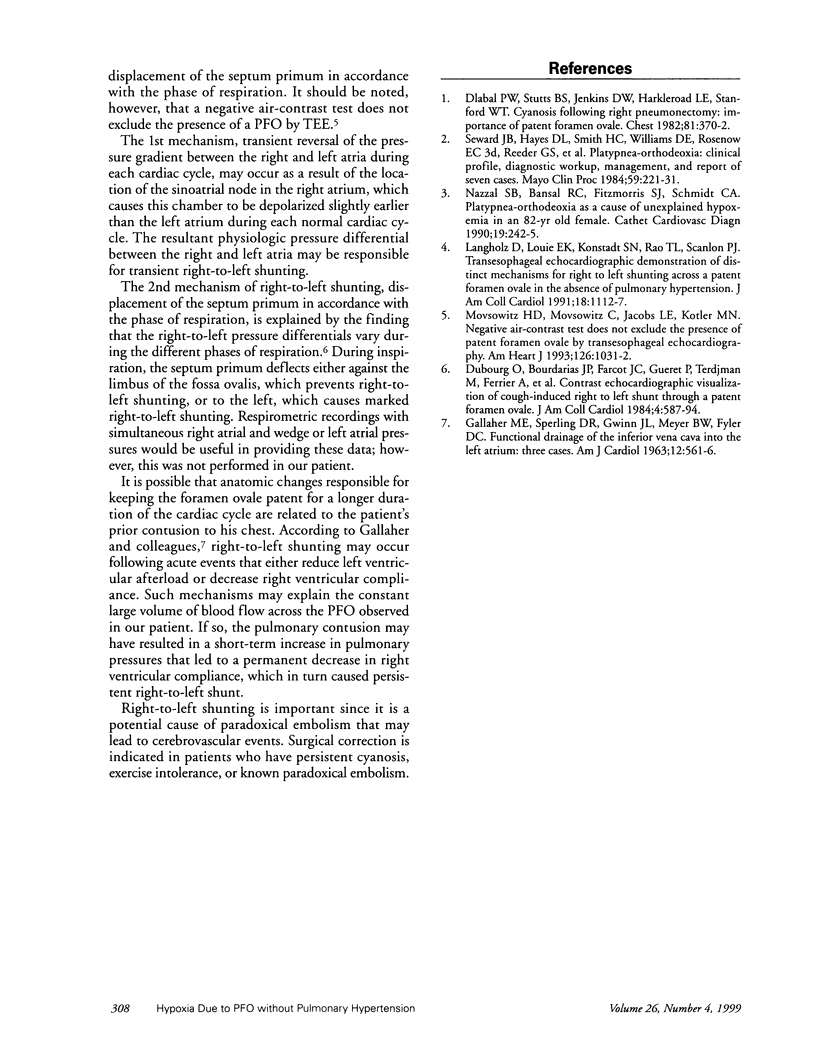Abstract
In most patients with a patent foramen ovale, blood flows from the left atrium to the right atrium in the absence of pulmonary hypertension. Our report describes a patient with a patent foramen ovale in whom flow occurred from the right atrium to the left atrium in the absence of pulmonary hypertension. We discuss hemodynamic findings and present a brief review of the pertinent medical literature regarding this phenomenon. We also discuss the role of transesophageal echocardiography in the diagnosis of this condition and in the elucidation of the underlying mechanisms, and we suggest several mechanisms that may explain the occurrence of this phenomenon in our patient.
Full text
PDF


Images in this article
Selected References
These references are in PubMed. This may not be the complete list of references from this article.
- Dlabal P. W., Stutts B. S., Jenkins D. W., Harkleroad L. E., Stanford W. T. Cyanosis following right pneumonectomy: importance of patent foramen ovale. Chest. 1982 Mar;81(3):370–372. doi: 10.1378/chest.81.3.370. [DOI] [PubMed] [Google Scholar]
- Dubourg O., Bourdarias J. P., Farcot J. C., Gueret P., Terdjman M., Ferrier A., Rigaud M., Bardet J. C. Contrast echocardiographic visualization of cough-induced right to left shunt through a patent foramen ovale. J Am Coll Cardiol. 1984 Sep;4(3):587–594. doi: 10.1016/s0735-1097(84)80106-0. [DOI] [PubMed] [Google Scholar]
- GALLAHER M. E., SPERLING D. R., GWINN J. L., MEYER B. W., FYLER D. C. FUNCTIONAL DRAINAGE OF THE INFERIOR VENA CAVA INTO THE LEFT ATRIUM--THREE CASES. Am J Cardiol. 1963 Oct;12:561–566. doi: 10.1016/0002-9149(63)90196-6. [DOI] [PubMed] [Google Scholar]
- Langholz D., Louie E. K., Konstadt S. N., Rao T. L., Scanlon P. J. Transesophageal echocardiographic demonstration of distinct mechanisms for right to left shunting across a patent foramen ovale in the absence of pulmonary hypertension. J Am Coll Cardiol. 1991 Oct;18(4):1112–1117. doi: 10.1016/0735-1097(91)90775-5. [DOI] [PubMed] [Google Scholar]
- Movsowitz H. D., Movsowitz C., Jacobs L. E., Kotler M. N. Negative air-contrast test does not exclude the presence of patent foramen ovale by transesophageal echocardiography. Am Heart J. 1993 Oct;126(4):1031–1032. doi: 10.1016/0002-8703(93)90735-r. [DOI] [PubMed] [Google Scholar]
- Nazzal S. B., Bansal R. C., Fitzmorris S. J., Schmidt C. A. Platypnea-orthodeoxia as a cause of unexplained hypoxemia in an 82-yr-old female. Cathet Cardiovasc Diagn. 1990 Apr;19(4):242–245. doi: 10.1002/ccd.1810190405. [DOI] [PubMed] [Google Scholar]
- Seward J. B., Hayes D. L., Smith H. C., Williams D. E., Rosenow E. C., 3rd, Reeder G. S., Piehler J. M., Tajik A. J. Platypnea-orthodeoxia: clinical profile, diagnostic workup, management, and report of seven cases. Mayo Clin Proc. 1984 Apr;59(4):221–231. doi: 10.1016/s0025-6196(12)61253-1. [DOI] [PubMed] [Google Scholar]




